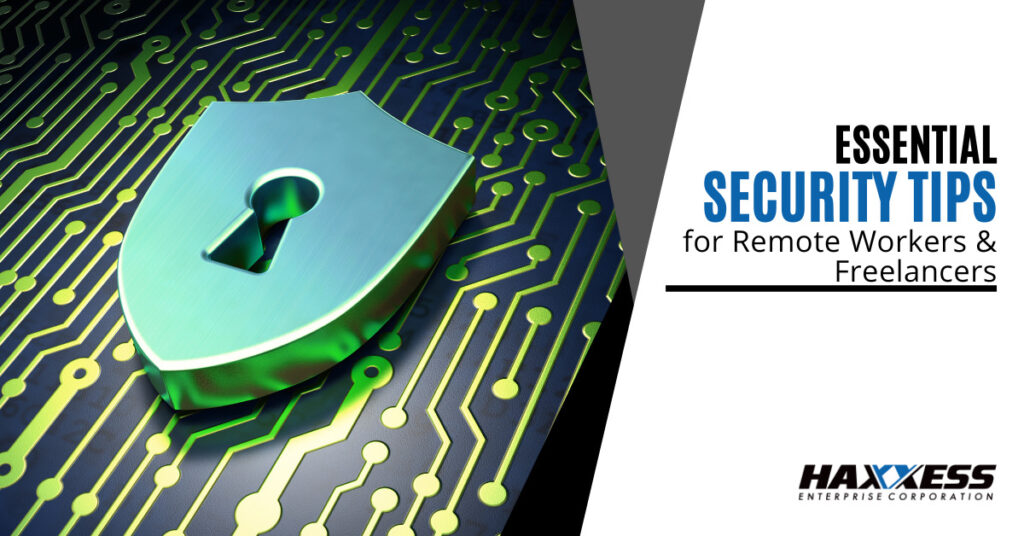
The freedom and flexibility of remote work are undeniable perks. But with the ability to work from anywhere comes a unique set of security challenges. Unsecured networks, phishing scams, and lost devices can all pose serious threats to your data and your clients’ or company’s information.
But with a few key security measures in place, you can transform your home office, or even local coffee shop, into a secure and productive workspace. Here are some essential tips to keep your data safe and your mind at ease.
Your laptop and smartphone are your digital workhorses. Here’s how to ensure they’re secure fortresses.
This might seem obvious, but it’s crucial. Use complex passwords for all your accounts and enable MFA whenever possible. This adds an extra layer of security by requiring a second verification code after entering your password.
Encrypt your hard drive to protect sensitive data in case of theft or loss. Most operating systems offer built-in encryption features. This can be a lifesaver if your laptop is lost or stolen, and can save you from causing a major data breach.
Outdated software can contain vulnerabilities that hackers exploit. Set your devices to automatically download and install updates for the operating system and all applications. Businesses with multiple remote workers should invest in an endpoint device management system (such as Microsoft Intune). These systems automate updates and many other security functions.
The internet connection you use can be a security vulnerability. Here’s how to fortify it.
Public Wi-Fi networks are notoriously insecure. If you must use one, consider using a Virtual Private Network (VPN) to encrypt your internet traffic and mask your IP address. A VPN creates a secure tunnel between your device and a remote server, safeguarding your data. Another alternative is using a mobile hotspot from your phone.
If you’re working from home, ensure your Wi-Fi network is secure. Use a strong WPA3 encryption protocol (available in Wi-Fi 6 routers) and a unique password for your network. Don’t share your Wi-Fi password with everyone who walks by. Instead, add a guest network that keeps guest connections separate from your work and personal connections.
Be cautious when connecting to unknown Wi-Fi networks, especially those with generic names. Hackers sometimes create fake networks to lure unsuspecting users. If you’re traveling, make sure you’re connecting to an official hotel, airport, or restaurant Wi-Fi network, and not a copycat set up by scammers.
Phishing emails and scam attempts are a constant threat. Here’s how to avoid becoming a victim.
Don’t click on links or download attachments from suspicious emails, even if they appear to be from someone you know. Always verify the sender’s email address before clicking anything. This is especially important for freelancers who may be working with multiple clients, making it easy to mistake a phishing email for a legitimate one.
Phishing emails often create a sense of urgency to pressure you into clicking on a link or providing personal information. If an email seems too good to be true, or if it demands immediate action, it’s probably a scam.
If you receive an email about your account or a payment, don’t reply directly to the email. Instead, log in to your account directly (through a verified website) and contact the company through their official channels to confirm the legitimacy of the request. The same goes for shipment tracking notifications. Don’t click a link in a text or email, instead go to the appropriate website directly.
Cloud storage services offer a convenient way to store and access your files remotely. However, security is paramount here too.
Choose a reputable cloud storage provider with a strong track record of security. Look for providers that offer features like encryption and two-factor authentication.
Don’t share everything in the cloud. Be mindful of what information you store online and only share files with authorized users. Be careful to check permissions when you copy sharing links, it’s a common mistake to leave a default of “can edit” when you really mean to share view-only access.
Cloud storage is convenient, but it’s not foolproof. Maintain regular backups of your critical data on a local hard drive as well. Just ensure that your hard drive is properly secured.
Whether you’re a business or freelancer in Northern Ontario, the experts at Haxxess can help you put strong remote work security in place to protect you from data breaches and give you peace of mind.
Contact us today to schedule a free consultation! Call 705-222-8324 or reach out online.